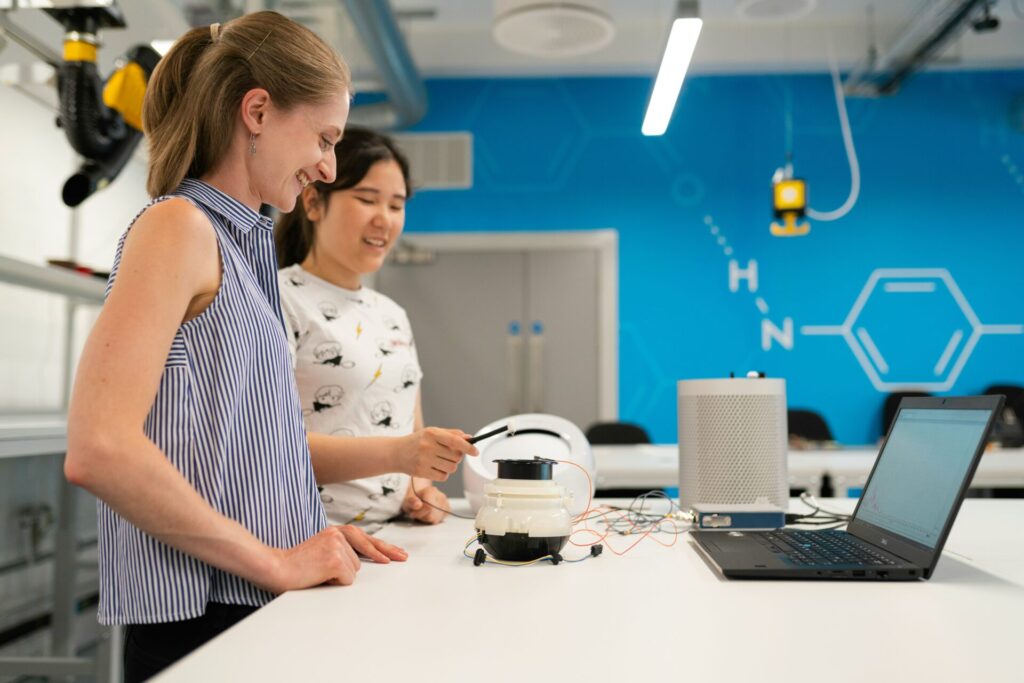It can be hard for students to know which A-Levels to take to study Engineering at the university. Studying Engineering is definitely a great choice, but taking the right A-Levels is one of the most important decisions to have success in your application.
That’s why at Immerse Education, we ensure our Engineering Summer School students have access to 1:1 personalised tutorials with expert tutors. So they’ll have solid confidence in their next steps in education.
We’ve also created this guide to help students like yourself decide which A-Levels to take in preparation for studying Engineering at the university.
Our guide includes what A-Level requirements various Engineering degrees require and where Engineering graduates go. Dive in!
What A-Levels Are Needed for Engineering?
Engineering is a vast umbrella course because it contains several specialisations underneath it. Not to mention that each university has its own set of Engineering courses to offer. In addition, each university and Engineering course has its unique A-Level requirement.
To help you understand what A-Levels are needed for Engineering, below are some entry requirements for the Top UK Engineering universities in the UK.
Once you finish reading this section, you’ll know what Engineering courses are available to you. And what A-Levels to target so you can increase your chances of pursuing the Engineering course you’re interested in.
Let’s begin with the University of Cambridge.
University of Cambridge
What’s the Engineering A-Level requirement for the University of Cambridge? A*A*A. All Cambridge colleges require A-Level Mathematics and Physics. Some colleges go as far as requiring the third A-Level subject to be science/maths.
Guess what Cambridge highly recommends your third subject to be? If you say, “Further Mathematics.” You got it right!
Are you wondering what the majority of Cambridge Engineering entrants achieved in their A-Level? From 2017-2019, 87% had at least A*A*A* grades.
Of the successful applicants:
- 98% took Physics
- 95% Further Mathematics
- 62% Chemistry
University of Oxford
The University of Oxford requires A-Level grades of A*A*A, with A*s in Physics, Maths, or Further Maths.
What are the essential A-Level subjects for aspiring Engineers who want to study at Oxford? Mathematics and Physics.
How about useful A-Level subjects that are not considered necessary for application? Further Mathematics. Further Maths is not required, but it’s helpful for students in finishing their Engineering course.
The Engineering Science course at the University of Oxford lasts for 4 years. During your third and fourth years, you can choose to specialise in one of the six branches of engineering:
- Biomedical Engineering
- Chemical Engineering
- Civil Engineering
- Electrical Engineering
- Information Engineering
- Mechanical Engineering
Imperial College London
What A–Level Subjects Are Needed to Study Civil Engineering?
There are two courses available for Civil and Environmental Engineering at Imperial College:
What’s the minimum A-Level offer for both Civil Engineering courses? A* A* A. But that’s for 3 A-Levels.
What if the prospective student took 4? Then it’s A* A A A.
Here are the required subjects:
- A* in Maths
- A* in Physics if you’re applying with 3 A-Levels or A if you’re applying with 4 A-Levels
- A in a third/fourth A-Level subject
Please note that General Studies and Critical Thinking are not valid.
What A– Level Subjects Are Needed to Study Mechanical Engineering?
Mechanical Engineering at Imperial College London offers you two course categories: Four-year or Five-year courses.
For the Four-year courses:
- MEng Mechanical Engineering
- MEng Mechanical Engineering with a Year Abroad
- MEng Mechanical with Nuclear Engineering
For the Five-year courses:
- MEng Mechanical Engineering with a Year in Industry
- MEng Mechanical Engineering with a Year in Industry and a Year Abroad
- MEng Mechanical Engineering with Nuclear Engineering and a Year in Industry
The minimum standard A-Level entry for these Mechanical Engineering courses is A*A*A or A*AAA overall, with
- A* in Mathematics
- A* in Physics if you’re applying with 3 A-Levels or A if you’re applying with 4 A-Levels
- A in a third/fourth A-Level subject
The Imperial College London doesn’t accept General Studies and Critical Thinking for its Mechanical Engineering courses. If you’re interested in becoming a mechanical engineer but don’t know what jobs will be available to you, browse our top mechanical engineering career prospects after university.
What A– Level Subjects Are Needed to Study Chemical Engineering?
The Imperial College London offers three types of Chemical Engineering courses:
- MEng Chemical Engineering
- MEng Chemical Engineering with a Year Abroad
- MEng Chemical with Nuclear Engineering
For all three, the minimum offer is A*A*A overall, with
- A* in Maths
- A* in Chemistry
- A in Biology, Further Mathematics, Physics, Business Studies, or Economics
Are you studying a 4th A-Level? Then the minimum grade is an A in any of the following preferred subjects:
- Physics
- Biology
- Further Mathematics
- Business Studies Economics at grade A.
Please note that Imperial College does not accept Critical Thinking and General Studies as one of your A-Levels.
Are you curious about the A-Level offer range made to at least 80% of the 2021 A-Level applicants?
- A*A*A–A*A*A* for the 3 A-Level offer
- A*A*AA for the 4 A-Level offer
What A– Level Subjects Are Needed to Study Electrical and Electronic Engineering?
What are the Electrical and Electronic Engineering courses available at the Imperial College London?
Bachelor of Engineering (3-year course)
Master of Engineering (4-year course)
- MEng Electrical and Electronic Engineering
- MEng Electrical and Electronic Engineering with Management
- MEng Electrical and Electronic Engineering with a Year Abroad
- MEng Electronic and Information Engineering
- MEng Electronic and Information Engineering with a Year Abroad
The A-Level requirement for the Electrical and Electronic Engineering courses is A*A*A or A*AAA overall. What are the required subjects?
- A* in Maths
- A* in Physics if you’re applying with 3 A-Levels or A if you’re applying with 4 A-Levels
- A in a third/fourth A-Level subject
What do you think the Imperial College London recommends for the third/fourth A-Level subjects?
- Further Mathematics (strongly recommended but not required)
- Electronics
- Computer Science /Computing
- Design and Technology
- Chemistry
Do keep in mind that General Studies and Critical Thinking are not accepted as one of your A-Levels.
University of Warwick
Two general categories for Warwick’s Engineering courses are Bachelor of Engineering (BEng) and Master of Engineering (MEng.)
Bachelor of Engineering (BEng)
- BEng Automotive Engineering
- BEng Biomedical Systems Engineering
- BEng Civil Engineering
- BEng Electrical and Electronic Engineering
- BEng Electronic Engineering
- BEng Engineering Business Management
- BEng Engineering
- BEng Manufacturing and Mechanical Engineering
- BEng Mechanical Engineering
- BEng Systems Engineering
Warwick’s typical A-Level offer for Bachelor of Engineering courses is AAA, including Mathematics and Physics. Of course, each course may have its unique additional requirements or recommendations.
Master of Engineering (MEng)
- MEng Automotive Engineering
- MEng Biomedical Systems Engineering
- MEng Civil Engineering
- MEng Electrical and Electronic Engineering
- MEng Electronic Engineering
- MEng Engineering
- MEng Manufacturing and Mechanical Engineering
- MEng Mechanical Engineering
- MEng Systems Engineering
What’s Warwick’s typical A-Level offer for Master of Engineering courses? A*AA with Mathematics and Physics.
There’s one other set of Engineering courses we have yet to mention.
Computer Systems Engineering
Warwick offers two types of Computer Systems Engineering courses:
A-Level offer: AAA with A in Mathematics
A-Level Offer: A*AA with A in Mathematics
We set Computer Systems Engineering apart because their A-Level requirement differs slightly from the rest.
Unlike the usual Maths/Physics combo other Engineering courses require, the Computer Systems Engineering courses only call for Mathematics.
It’s also essential to mention that some Warwick’s Engineering courses exclude General Studies and Critical Thinking.
University of Edinburgh
The University of Edinburgh offers a total of 17 courses in Engineering. Let’s look at some of them and their respective A-Level offers.
Chemical Engineering
Edinburgh’s other Engineering courses consist of the following:
Both Chemical Engineering courses require A-Level grades of AAA – ABB, with Mathematics and Chemistry at B.
Other Engineering Courses
Edinburgh’s other Engineering courses consist:
- BEng Civil Engineering
- MEng Civil Engineering
- BEng Electrical and Mechanical Engineering
- MEng Electrical and Mechanical Engineering
- BEng Electronics and Computer Science
- MEng Electronics and Computer Science
- BEng Electronics and Electrical Engineering
- MEng Electronics and Electrical Engineering
- BEng/MEng Engineering
- BEng Mechanical Engineering
- MEng Mechanical Engineering
- BEng Structural and Fire Safety Engineering
- MEng Structural and Fire Safety Engineering
- BEng Structural Engineering with Architecture
- MEng Structural Engineering with Architecture
The A-Level requirement for these Engineering courses is AAA – ABB, with Mathematics and one of these useful subjects at B (at least):
- Physics (preferred)
- Biology
- Chemistry
- Computing Science/Computing
- Design & Technology (Food Technology is not included)
- Engineering
University College London (UCL)
The University College London has specific A-Level requirements for each engineering course. Here are some of them:
Biochemical Engineering
The A-Level requirement for Biochemical Engineering is AAA, with Mathematics and any one from the following subjects:
- Biology
- Chemistry
- Physics
Biomedical Engineering
UCL’s A-Level requirement for Biomedical Engineering is AAA, with Mathematics and Physics at grade A.
Bioprocessing of New Medicines (Science and Engineering) BSc
What’s the A-Level requirement for Bioprocessing of New Medicines? It’s AAA with Biology and Chemistry.
Chemical Engineering
The A-Level requirement for Chemical Engineering at UCL is AAA, with Mathematics and Chemistry. For the 3rd A-Level, another science subject is preferred but not essential.
Civil Engineering
What is the A-Level requirement for Civil Engineering at UCL? A*AA, with no specific subjects. But at least two A-level subjects should be taken from UCL’s long list of preferred A-Level subjects.
Electronic and Electrical Engineering
The A-Level requirement for UCL’s Electronic and Electrical Engineering is A*AA, with A* in Mathematics. Further Maths or Physics are preferred.
Mechanical Engineering
To be eligible for UCL’s Mechanical Engineering from an A-Level background, the required grade is A*AA. Essential subjects include Mathematics and Physics, with an A* in any of them.
How about the 3rd subject? The following are preferred but not essential:
- Further Maths
- Economics
- Design and Technology
University of Leeds
What Engineering courses does the University of Leeds offer?
- Aeronautical and Aerospace Engineering MEng, BEng
- Automotive Engineering MEng, BEng
- Mechanical Engineering MEng, BEng
- Medical Engineering MEng, BEng
The required A-Level grade for
is A*AA, with Maths and Physics or Chemistry. The A* should be in Maths or Physics (if you took it.) If you take an A-Level Science subject, you’ll be asked to have an A and pass the practice science element.
Please note that A-Level Critical Thinking and General Studies are not accepted.
What about the A-Level entry requirement for Medical Engineering? The grade requirement is A*AA, with Mathematics and any of the following required subjects:
- Physics
- Chemistry
- Biology
The A* should be for Maths (or Physics if taken at A-Level.) Yet again, it’s necessary to pass the practical science element when taking an A-Level Science subject.
Also, General Studies or Critical Thinking are excluded.
To learn more about the topics you can expect to learn from a university-level Engineering programme with Immerse, download a syllabus overview.
How Many A-Level Subjects Are to Be Completed?
You may have noticed from the previous section that universities require you to complete three A-Level subjects.
If you want to increase your chances of acceptance at the Top UK Engineering universities, it’s best to aim for A*.
What Are the Entry Requirements For Engineering?
The typical entry requirements for Engineering include the following:
- Specific A-Level grades and subjects depending on the university
- Usual alternative routes to A-Levels are IB and Scottish Highers
- Personal Statement to demonstrate why you should be considered
Some universities require additional tests to determine your eligibility for taking Engineering courses, such as:
- Oxford – Physics Aptitude Test (PAT)
- Cambridge – Engineering Admissions Assessment (ENGAA)
Engineering Graduate Destinations
The Association of Graduate Careers Advisory Services (AGCAS) “What do graduates do?” 2021/22 survey reports the following:
- 69.7% of Civil Engineering graduates work full-time in the UK within 15 months after graduation.
- 68.5% of Electrical and Electronic Engineering graduates are employed full-time within 15 months of completing the course.
- 46.1% of Electrical and Electronic Engineering graduates working full-time are Engineering Professionals, and 25% are Information Technology professionals.
- 66.1% of Mechanical Engineering graduates work full-time in the UK within 15 months after graduation.
- Most Mechanical (60%) and Civil Engineering (80.6%) graduates work as Engineering Professionals.
Do you want to know more about university-specific Engineering graduate destinations? Let’s start with the University of Oxford:
Oxford
Oxford Engineering Science graduates have gone on to work in various sectors, such as:
- Engineering & Manufacturing
- Investment
- Banking
- Consultancy
- Accountancy
- Computing
- IT
- Energy
- Environment-related
Cambridge
Do you know that 99% of Cambridge Engineering graduates are employed or enrolled in further study within 15 months after graduation? Furthermore, those employed enjoy average entry-level salaries of £35,000.
Here are some specific positions and companies Cambridge Engineering graduates occupy:
- Graduate Engineer at Atkins
- Analyst at Goldman Sachs
- Software Engineer and Real-Time Control at UK Atomic Energy Authority
- Manufacturing Engineer at Rolls-Royce PLC
- Graduate RF Systems Engineer at Airbus Defence and Space
Imperial College London
Imperial College London offers a variety of Engineering courses at the onset. Let’s zoom in and take a look at Chemical Engineering.
Where do Imperial College Chemical Engineering graduates go after completing their course? Industries include:
- Process
- Energy
- Healthcare
- Construction
- Chemical Plants
- Public Utility
- Research
- Consultancy
- IT
Here are some of the employers of Imperial College Chemical Engineer graduates:
- National Nuclear Laboratory
- Deutsche Bank
- JPMorgan Chase
- BP (Oil Industry Company)
Do you want to know more about the various career opportunities for Engineering graduates? If so, you may want to read “What Can You Do With An Engineering Degree?”
If you’re looking to study engineering at university, it’s important that you choose the right A-Levels. The best A-Levels to take for engineering are a Maths/Science combo, especially Maths/Physics/Chemistry combination.
So make sure you pick up those much-needed maths and science skills! Good luck with your studies – we know you can do it!
Join the Immerse Education 2025 Essay Competition
Follow the instructions to write and submit your best essay for a chance to be awarded a 100% scholarship.



















